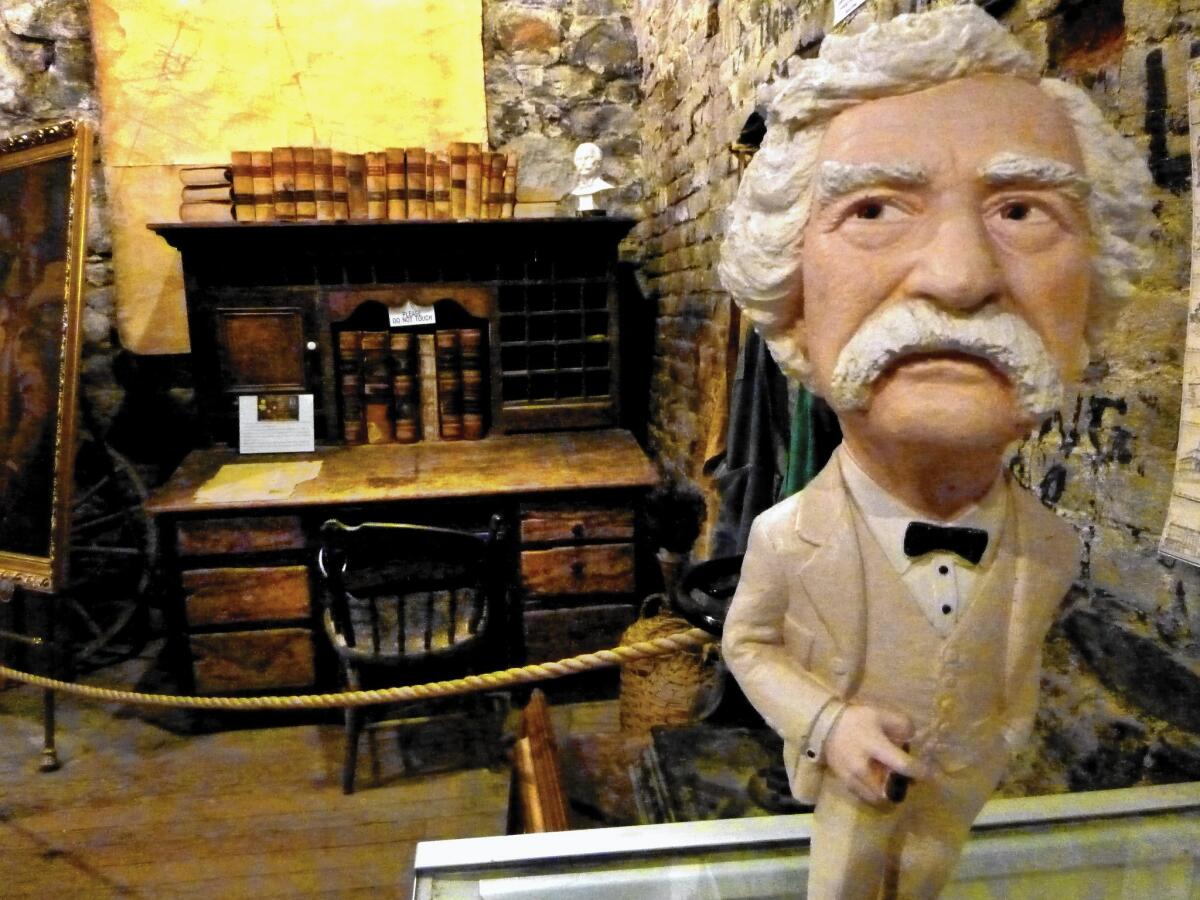Nevada newspaper where Mark Twain made his name is back in business

Reporting from Virginia City, Nev. — One wonders what Mark Twain himself would make of the news: The Gold Rush-era newspaper for which he once penned stories and witticisms on frontier life as a fledgling journalist is once again in print after a decades-long hiatus.
Following numerous attempts at solvency, the Territorial Enterprise, once the region’s premier recorder of gossip, scandal, satire and irreverent tall tales — before Nevada was even a state — is back, this time as a traditional glossy monthly magazine and online edition, territorialenterprise.com.
Would Twain use Twitter to bemoan the deplorable state of the press, as he once did by pen? (“If you don’t read the newspaper, you’re uninformed. If you do read the newspaper, you’re misinformed.”)
Or gnash his teeth at media leadership? (“I am not the editor of a newspaper and shall always try to do the right thing and be good so that God will not make me one.”)
Even the Enterprise’s new editor, Elizabeth Thompson, guesses that Samuel Clemens would have a field day.
“I don’t think he could resist with some witticism about the many attempts to resurrect the paper over the years,” she said. “He’d have something to say. He’d get a kick out of it.”
With a daily circulation of 15,000 at its peak in the 1860s, the Enterprise was Nevada’s first newspaper and the largest west of the Mississippi as it chronicled the frenzy and financial fallout of the Comstock Lode of silver ore discovered on the eastern slope of Mt. Davidson.
After the mining boom died, the paper continued to tell the story of a rough town where unwashed men settled scores with six-shooters. The original Enterprise ceased publication in 1893, along with an economy of words in its epitaph: “For sufficient reasons we stop.”
Since then, the paper has been revived numerous times, mostly notably by railroad historian Lucius Beebe, who sold it in 1961. Behind the present incarnation is Scott Faughn, also publisher of the Missouri Times, which focuses on politics and policy.
In its heyday, the Enterprise not only covered the news — it made news.
As editors recently wrote, “Reporters William ‘Dan De Quille’ Wright, James ‘Lying James’ Townsend and Samuel ‘Mark Twain’ Clemens perfected the art of the Western tall tale with articles that became legendary for their wit.”
Thompson said the paper aims to carry on that legacy.
The maiden edition, published in March, includes, along with sundry news and an interview with Gov. Brian Sandoval, a modern reprise of the so-called “sagebrush humor” Twain helped make famous before he became America’s favorite man of letters.
The piece is a tall tale of the Comstock Mine and references famed mining engineer Philipp Deidesheimer. It begins:
“I have returned from an expedition into the most hidden and harrowing nooks and crannies of Mt. Davidson with sore feet, bruised knees, ragged clothes, and a tale about our storied past that will surely rattle Mr. Deidesheimer’s old timbers — and yours, if you have them — to their very foundations.”
Legend has it that Twain’s first piece for the newspaper began: “A thunderstorm made Beranger a poet, a mother’s kiss made Benjamin West a painter and a salary of $15 a week makes us a journalist.”
Clemens had traveled west from Missouri with his brother, Orion Clemens, who became secretary of the Nevada Territory before the area achieved statehood in 1864. Historians say Samuel Clemens first used the pen name “Mark Twain” while at the Enterprise.
In three years, he went on to write stories about territory politicians, shoot-’em-ups and the stock market — some of which were reprinted in his 1872 book “Roughing It.”
A story on the Pony Express included this description: “No matter whether it was winter or summer, raining, snowing, hailing, or sleeting, or whether his ‘beat’ was a level straight road or a crazy trail over mountain crags and precipices, or whether it led through peaceful regions or regions that swarmed with hostile Indians, he must be always ready to leap into the saddle and be off like the wind!”
Of an Enterprise business reporter who filed a report drunk, he wrote:
“Owing to the fact that our stock reporter attended a wedding last evening, our report of transactions in that branch of robbery and speculation is not quite as complete and satisfactory as usual this morning. About 11 o’clock last night the aforesaid remarker pulled himself up stairs by the banisters, and stumbling over the stove, deposited the following notes on our table, with the remark, ‘S(hic)am, just ‘laberate this, w(hic)ill, yer?’ We said we would, but we couldn’t. If any of our readers think they can, we shall be pleased to see the translation.”
When Twain fabricated a murder, competitors responded with outrage. “The man who could pen such a story, with all its horrors depicted in such infernal detail, and which to our knowledge sent a pang of terror to the hearts of many persons, as a joke, in fun, can have but a very indefinite idea of the elements of a joke,” wrote the Virginia Evening Bulletin, a competitor.
The Enterprise printed a retraction: “I take it all back. Mark Twain.”
In Virginia City, reaction to the rebirth of the Enterprise has been positive.
“I’m excited about it; it tickles me,” said Sandi Sweetwater, who manages a gift shop and offers impromptu tours of the newspaper’s original offices a floor below.
She pointed to Twain’s original desk, an in-office toilet, a spittoon — even an original bottle of Perry Davis’ Pain Killer, from which Twain supposedly took occasional nips.
Across the street at the Mark Twain Saloon, owner John Schafer said that even the pen name Mark Twain might have Nevada roots. While historians believe the name comes from Clemens’ Mississippi riverboat days — a river man’s phrase for water two fathoms deep — the bar owner says there’s another theory.
“There’s talk Clemens got the name Mark Twain in Virginia City saloons,” he said. “The phrase comes from ordering two drinks at once and asking that they be served on credit.”
Thompson has high hopes for the paper, which is beginning with a circulation of 2,500. She has spent recent months researching Twain and the period and is ready to try to match, if not precisely the wit, then at least the spirit.
“I think he’d be pleased at our effort to rejuvenate this paper yet again,” she said. “We hope he’s smiling upon this venture from either above or below.”
Twitter: @jglionna
More to Read
Sign up for Essential California
The most important California stories and recommendations in your inbox every morning.
You may occasionally receive promotional content from the Los Angeles Times.











